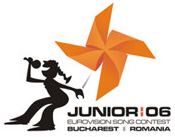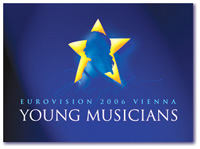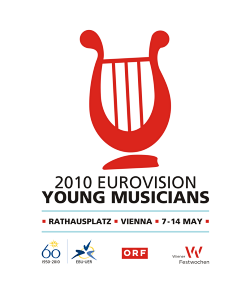
Romania has participated in the Eurovision Song Contest 22 times since its debut in 1994, and has placed in the top ten six times. Its best results were achieved by Luminița Anghel and Sistem in 2005, and by Paula Seling and Ovi in 2010, who both finished in third place. Selecția Națională, a song contest that has been taking place every year in Romania except for 2021, has been used to select the country's entry for the Eurovision Song Contest. The later year saw Romania conducting an internal selection.

The Junior Eurovision Song Contest 2006 was the fourth edition of the annual Junior Eurovision Song Contest for young singers aged 8 to 15. On 2 December 2006, the contest was broadcast live from Bucharest, Romania making it the second time the contest had been held in a capital city. It was organised by the Romanian national broadcaster, Romanian Television (TVR), in co-operation with the European Broadcasting Union (EBU).

Marija Šestić is a Bosnian singer and musician. She is most known for representing Bosnia and Herzegovina in the Eurovision Song Contest 2007 in Helsinki, Finland. Performing the song "Rijeka bez imena", Šestić collected a total of 106 points, placing eleventh out of twenty-four entries.

The Eurovision Young Musicians 2002 was the eleventh edition of the Eurovision Young Musicians, held at Konzerthaus in Berlin, Germany on 19 June 2002. Organised by the European Broadcasting Union (EBU) and host broadcaster Zweites Deutsches Fernsehen (ZDF), musicians from seven countries participated in the televised final. A total of twenty countries took part in the competition. All participants performed a classical piece of their choice accompanied by the Deutsches Symphonie-Orchester Berlin, conducted by Marek Janowski. Czech Republic and Romania made their début while six countries returned to the contest, they were Croatia, Cyprus, Denmark, Greece, Italy and Sweden.

The Eurovision Young Musicians 2004 was the twelfth edition of the Eurovision Young Musicians, held at the Culture and Congress Centre in Lucerne, Switzerland on 27 May 2004. Organised by the European Broadcasting Union (EBU) and host broadcaster Swiss Broadcasting Corporation, musicians from seven countries participated in the televised final. Switzerland and broadcaster SRG SSR previously hosted the contest in 1984. A total of seventeen countries took part in the competition therefore a semi-final was held in the same venue on 22 and 23 May 2004. All participants performed a classical piece of their choice accompanied by the Lucerne Symphony Orchestra, conducted by Christian Arming.

The Eurovision Young Musicians 2006 was the thirteenth edition of the Eurovision Young Musicians, held at the Rathausplatz in Vienna, Austria on 12 May 2006. Organised by the European Broadcasting Union (EBU) and host broadcaster Österreichischer Rundfunk (ORF), musicians from seven countries participated in the televised final. This was the first time that the competition was held on an open-air stage and was the beginning of the annual Vienna Festival. Austria and broadcaster ORF previously hosted the contest in 1990 and 1998.

The Eurovision Young Musicians 1994 was the seventh edition of the Eurovision Young Musicians, held at the Philharmonic Concert Hall in Warsaw, Poland, afterwards the last year's contest, winning country, Bartłomiej Nizioł performing the violin instrument, dated between the 9 and 14 June 1994. Organised by the European Broadcasting Union (EBU) and host broadcaster Telewizja Polska (TVP), musicians from eight countries participated in the televised final. A total of twenty-four countries took part in the competition therefore a semi-final was held in the same venue on 9 and 10 June 1994. Out of the 24 countries, 16 did not qualify to the final, including the host country Poland. All participants performed a classical piece of their choice accompanied by the Warsaw Symphony Orchestra, conducted by Kazimierz Kord.

The Eurovision Young Musicians 2008 was the fourteenth edition of the Eurovision Young Musicians, held at the Rathausplatz in Vienna, Austria on 9 May 2008. Organised by the European Broadcasting Union (EBU) and host broadcaster Österreichischer Rundfunk (ORF), musicians from seven countries participated in the televised final. This was the second time that the competition was held on an open-air stage and was the beginning of the annual Vienna Festival. Austria and broadcaster ORF previously hosted the contest in 1990, 1998 and 2006.

The Eurovision Young Musicians 2010 was the fifteenth edition of the Eurovision Young Musicians, held at the Rathausplatz in Vienna, Austria on 14 May 2010. Organised by the European Broadcasting Union (EBU) and host broadcaster Österreichischer Rundfunk (ORF), musicians from seven countries participated in the televised final. This was the third time that the competition was held on an open-air stage and was the beginning of the annual Vienna Festival. Austria and broadcaster ORF previously hosted the contest in 1990, 1998, 2006 and 2008.

The Eurovision Young Musicians 2012 was the sixteenth edition of the Eurovision Young Musicians, held at the Rathausplatz in Vienna, Austria on 11 May 2012. Organised by the European Broadcasting Union (EBU) and host broadcaster Österreichischer Rundfunk (ORF), musicians from seven countries participated in the televised final. This was the fourth time that the competition was held on an open-air stage and during the annual Vienna Festival. Austria and broadcaster ORF previously hosted the contest in 1990, 1998, 2006, 2008 and 2010.

Pavel Parfeni, known professionally as Pasha Parfeny, is a Moldovan musician, singer and songwriter. He represented Moldova at the Eurovision Song Contest 2012 in Baku, Azerbaijan, where he placed 11th with his song "Lăutar". He was formerly known for being the lead singer of the Moldovan band SunStroke Project.

The United Kingdom has participated in the biennial classical music competition Eurovision Young Musicians 15 times since its debut in 1982, most recently taking part in 2018 after a 8-year absence. The United Kingdom hosted the inaugural contest in 1982 and won the contest in 1994. The country returned to the contest in 2018 as hosts.

Norway has participated in the biennial classical music competition Eurovision Young Musicians 17 times since its debut in 1982, winning the contest for the first time in 2012. Norway did not officially take part in 1984, the only contest the country has missed as of 2016, and hosted the contest in 2000.

Sweden has participated in the biennial classical music competition Eurovision Young Musicians 13 times since its debut in 1986, winning the contest for the first time in 2006. Sweden are yet to host the contest.

Slovenia has participated in the biennial classical music competition Eurovision Young Musicians 12 times since its debut in 1994, winning the contest for the first time in 2010.

Portugal has participated in the biennial classical music competition Eurovision Young Musicians 4 times since its debut in 1990 and are yet to receive a top 3 placing in any contest. Portugal hosted the contest in 1996. Portugal previously attempted to take part in 1986, but were forced to withdrew as it had been unable to provide a "qualified candidate".

Serbia and Montenegro made their Eurovision Young Musicians debut and only participation at the Eurovision Young Musicians 2006, where they failed to qualify for the final.

Ukraine has participated twice in the Eurovision Young Musicians since its debut in 2008, most recently taking part in 2012. Ukraine was expected to return in 2020.

Bosnia and Herzegovina made their Eurovision Young Musicians debut and only participation at the Eurovision Young Musicians 2012 where they failed to qualify for the final. The country has not returned to the contest since.

Romania has participated in the Eurovision Young Dancers 2 times since its debut in 2003.


















